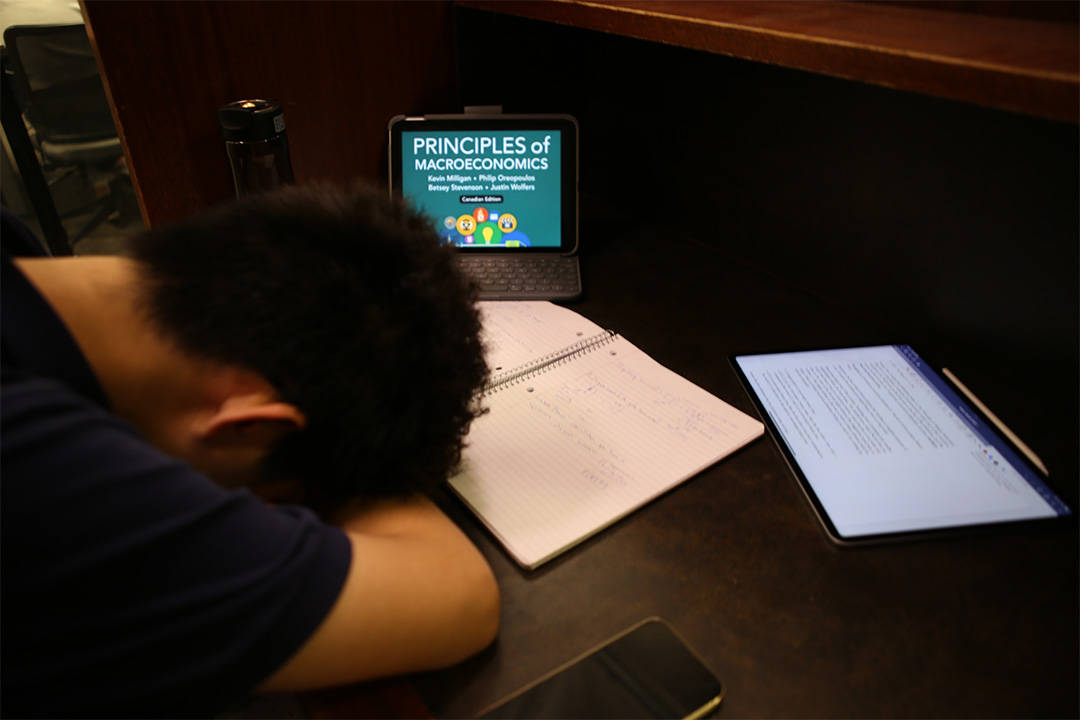ECO101 — Principles of Microeconomics and ECO102 — Principles of Macroeconomics are notoriously two of the most rigorous courses for first-year students hoping to go into programs like economics, finance, and business.
The two courses also stand out among first-year courses because they aim to bridge the gap between students with prior knowledge in economics and those with none. Ketaki Sarin, a fourth-year economics and math specialist and lead learning assistant at the Economics Study Centre (ESC), noted that this gap is especially high in ECO101 and ECO102 — some students might have a much better understanding of basic economic concepts going into the course than others. This means that some students will have to put in a lot of extra work to catch up.
The courses have a reputation for being difficult by design. Alaina Hu, a third-year double majoring in economics and psychology with a minor in statistics, told The Varsity in an interview that they seem to “weed out students” who do not have what it takes to go into programs that require higher-level economics courses.
Still, Sarin said that students should not buy into the fear surrounding these courses. She noted that it is a common belief among students that professors are unwilling to give them more than a 60 or 70 per cent grade in the class.
“Given the right inputs, it’s not impossible to get anything above 90,” Sarin said.
Using your ECO101 and ECO102 toolbox
This year, the Department of Economics released a toolbox of resources for struggling students called the Thrive Guide. The guide’s website describes that it is “inspired by the comments past students have left on Reddit forums about their experiences.”
The first part of the guide aims to provide students with an overview of what they can expect in the first-year economics courses, as well as advice from professors, advisors, and learning strategists.
Students also have a more intimate space to get answers to their questions, fill the gaps in their understanding, and develop a relationship with their instructors during professor and teaching assistant office hours. The ESC’s third- and fourth-year learning assistants serve the same purpose.
For students who prefer to learn from one another, Recognized Study Groups (RSGs) provide support through student-led groups, in which classmates meet weekly to cover lecture topics.
Lucas Georgescu, a first-year Rotman Commerce student, appreciates learning from his RSG group members since everybody is on the same level of understanding.
In an interview with The Varsity, Georgescu said, “Study groups, in my opinion, are better than just trying to figure out something alone. Even if you might not be able to focus, teaching each other the material is better than a professor teaching. Because a professor kind of assumes [what] you know, whereas other people — in the same situation as you — know how to explain it in a way that you’ll understand it.”
According to Professor Nazanin Khazra, faculty advisor at the ESC, the problem isn’t a lack of resources — it’s that students are neglecting to use them.
“Something I tell my students is that when you don’t use these resources, it’s like going to a nice Italian restaurant, ordering $500 worth of food, and then walking away,” Khazra said in an interview with The Varsity. She encourages her students to “go eat a nice Italian dinner” rather than waste all the services that their tuition has already paid for.
Acing the exam
Sarin emphasized starting preparation early, as economic concepts take time to sink in. Cramming 12 weeks of content into a few nights of studying certainly makes it difficult to effectively recall concepts.
When asked about successful study techniques, Khazra mentioned consistency. “One thing that’s different in university compared to high school is that no one’s watching; you are responsible for studying, for building good habits, for submitting your homework and quizzes on time… How do you do that? The key word here is to build a routine… you should go to all of your classes, you should go to all of your tutorials and office hours. Build a habit, stick to it.”
Hu reiterates the same point: consistency from the start is key to success. In an interview with The Varsity, she said, “I just wish I knew that how much effort I put in is what I’m going to get out of it. So I kind of wish I started taking it seriously in terms of developing good study habits from the beginning.”
Both Hu and Michelle Ren — a fourth-year Rotman student specializing in management with a focus in finance, and minoring in economics — also recommended taking practice tests. Ren explained that the tests helped her to “get used to the style of the questions” that would be on the test and to “[learn] how to respond to open-ended questions.”
Students can find past exams for ECO101 and ECO102 in the Old Exams Repository to get more practice.
“I think the main thing I would have wanted to know [in first year] is it gets easier. And no one tells you that because they don’t want you to let your guard down,” Sarin shared.
Ultimately, you’re not in this alone. Everywhere you turn, there will always be resources to help you, mentors to guide you, and friends to lean on. Always remember who is in your corner — hopefully, this will help you save your U of Tears for another day.



No comments to display.